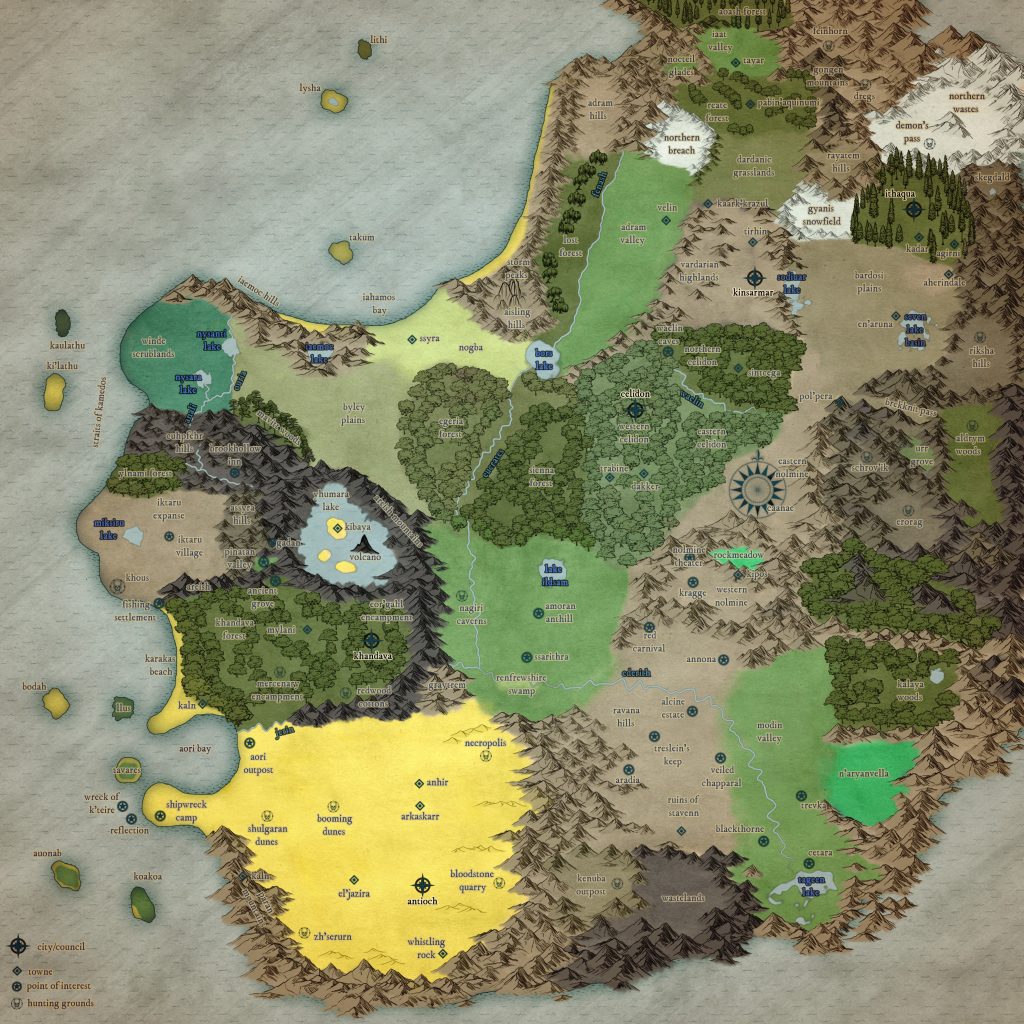Betrayal.
Ever since I came of age as a knight in the service of Khandava has this word laid claim to every aspect of that life. For over five hundred years has Khandava council stood stalwart against threats to the Redwood provinces, and when perfidious Ithaqua was overcome by its ambition for conquest, it was stalwart Khandava that felt its claws first. Lead by their self-crowned Prince Infin, the armies of Ithaqua turned on their erstwhile once-allies and where before the realm knew but skirmishes, it tasted war once again.
War is not unfamiliar to Khandava; indeed it has eked out an existence which has largely been a conflict for survival - one which has been the crucible in which its soul has been forged. From times immemorial when it claimed the fringes of magick, to the current day in its current form, it has been the world's bastard child, the unwanted and oft-unaccepted ends of entropy. From this adversity was born the bonds of a community which could not and would not break, but even those bonds were tested.
As raids were declared, swords crossed, and blood was shed, one truth became immediately evident: that comraderie alone would not prevail against the foes of the Redwood Provinces. The darkness gathered ever deeper, the baleful cries, slanders, and slurs of the arch-traitors intermixed with their blows into a cacophony of suffering that spread far beyond the bounds of the Khandavan forests, washing up upon the highlands of the Duchies and the forests of Celidon as well; and in the recognizance of this shared threat, accords were made, and our blades joined as one to fall upon the collective forces of Ithaqua and their Antiochian allies.
Where before the fangs of anti-magick clamped tightly upon the world their toxic bigotry sought to bully into submission, their resolve began to falter. It would not appear at first, but in the face of organized, mass opposition, their tactics became more grasping, erratic, and desperate. They redoubled their efforts, ensuring any who dared faced them if not defeated by by the weapons of Ithaqua, would be buried in the masses of flesh that they would bring for. Young and old, infirm and inexperienced, all were sacrificed to try to maintain the despot arch-Traitor's supremacy, in the hopes of breaking the collective will of the realm they sought to subjugate.
Anti-magick expected this to be a fire in which the realms burned, a deathblow that would signal the end of freedom in the realm and an usurpation of the natural order of things. Mathiaus went forth and tried to negotiate with them terms of surrender that such vexatious conflict might be ceased. The arch-traitors were not gracious in their potential victory however, gripped with vainglory and greed, and dictated terms which no sane person would have agreed to, including razing the Khandava council and plundering everything that ever had any value to it.
A defeated foe might be despondent given no peace and no respite; the bigoted slurs against Ryse did not cease, but neither too did the unbroken perseverance of the realms. In pressuring the conflict beyond the breaking point, Ithaqua overplayed their hand, and gambled their victory. They would claim not only Khandava, but each and every one of the free peoples of the realms. In that moment it mattered not whether the blood of the Leechwood flowed through their veins, whether they were Khandava-born, or of the Stavennite diaspora, it was made clear that only one option remained: fight.
And fight we did: against the ramshackle but undeniably-large press gangs of Ithaqua and Antioch were arrayed some of the greatest warriors these realms possess: Mathaius, Ryse, Eochaid, Pellerin, Galt, Ruga, and many others, willing to die in the cold and unforgiving battlefields of those northern wastes to secure the safety and freedom of us all, against the tyranny and ignorance of the anti-magick aggressors.
This came to a head in one final, decisive obelisk battle, which may have first appeared to be a loss, yet ended up deciding the fate of this war. Seeking to divide the attention of their opponents, a strike was made on two separate obelisks. Surely, it was believed, they could not muster a force to defend both. Even if one failed, the other would succeed - and so, battle for these islands was joined. One contingent headed by Alvetta and the coalition of magick, the other, largely lead by Naruj as Khandavan forces joined the sortie against anti-magic. As the battle worn on and endurance waned, the candle of hope guttered, and magick lost confidence, eventually quitting the field and leaving the combined forces of Khandava to stand on their own. This lead to a moment emblematic of the war itself: cut of from allies and support, Naruj held the obelisk himself solo for several long minutes which no doubt he counted as akin to hours against the combined weight of his enemies. Even faced with those insurmountable odds, Naruj fought on, and eventually, inevitably, fell.
Faced with such unbreakable determination, the tactics of Ithaqua once again stooped to another new low. To them it was anathema to admit defeat, and so they schemed on, devising a raid whereby one large detachment would venture into enemy holdings while another large force blockaded them. So egregious did this become, that in the instance where they did this to Khandava council, the powers that be took notice, and immediately ceased their aggression. In this moment, was the relief and justice so many clamoured for was granted, and its delay did not make it any less the sweeter.
Now, Ithaqua and Antioch lay barren husks, and I recount this tale, as caution: when your excesses grow so great that the entire realm assails against you, when your conflict becomes so deep that the only acceptable result to you is the utter destruction of one, or the other, then you may want to question your choices which lead to that point, and at the very least, you may wish to choose a different quarry than the Redwood Provinces.
The Leechwood prevails, now, as always, and forevermore.
In service,
Prophetess Reiley Virtanen
Penned by my hand on the 12th of Ferinus, in the year 246 AM.

